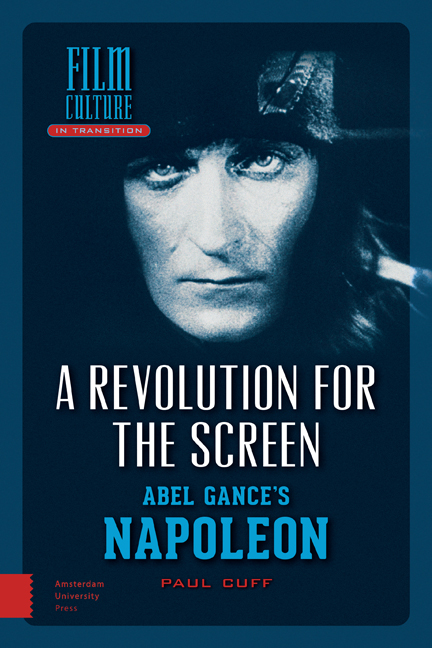Book contents
- Frontmatter
- Dedication
- Contents
- List of Illustrations
- Note on Formatting
- Acknowledgements
- Foreword
- Preface: Critical perspective
- 1 Napoleonic Ambition and Historical Imagination
- 2 Shaping Expectations: The Young Napoléon Bonaparte
- 3 Civilization and Savagery: Visions of the French Revolution
- 4 Mortal Gods: Voices of Power and of Providence
- 5 The Dark Light of Napoleonic Cinema
- 6 A View from the Margins of History
- 7 Melodrama and the Formulations of Family
- 8 Worlds in Transition: Class, consumption, Corruption
- 9 Death and Transfiguration
- Conclusion: The Case for Enthusiasm
- Filmography and Bibliography
- Index
- Film Culture in Transition
3 - Civilization and Savagery: Visions of the French Revolution
Published online by Cambridge University Press: 10 December 2020
- Frontmatter
- Dedication
- Contents
- List of Illustrations
- Note on Formatting
- Acknowledgements
- Foreword
- Preface: Critical perspective
- 1 Napoleonic Ambition and Historical Imagination
- 2 Shaping Expectations: The Young Napoléon Bonaparte
- 3 Civilization and Savagery: Visions of the French Revolution
- 4 Mortal Gods: Voices of Power and of Providence
- 5 The Dark Light of Napoleonic Cinema
- 6 A View from the Margins of History
- 7 Melodrama and the Formulations of Family
- 8 Worlds in Transition: Class, consumption, Corruption
- 9 Death and Transfiguration
- Conclusion: The Case for Enthusiasm
- Filmography and Bibliography
- Index
- Film Culture in Transition
Summary
Behold the World-Phoenix, in fire-consummation and fire-creation: wide are her fanning wings; loud is her death-melody, of battle-thunders and falling towns; skywards lashes the funeral flame, enveloping all things: it is the Death-Birth of a World! (Carlyle 1837: I/206).
Introduction
Despite his commitment to NAPOLÉON as a work of ‘education’ (1923a), Gance's film transcends factual authenticity. The blend of historical fidelity and glaring deviation has infuriated critics, most of whom have been unwilling to navigate its tortuous succession of fact and fabulation. Albert t’Serstevens compared Gance's screenplay to the work of Victor Hugo and Emile Zola, saying it was ‘very beautiful’ but also ‘perilous’. He chastised Gance for being seduced by ‘reductive details’ and losing sight of ‘the larger structure’: the filmmaker was ‘far more of a poet than a novelist’ and must eliminate anything that didn't ‘contribute directly to the whole’ (T’Serstevens 1925). Watching the completed film, Léon Moussinac felt he was being made to wade through ‘a mediocre library of badly compiled material’; Gance had wallowed in ‘romantic, sentimental lyricism gleaned from obscure correspondences and anecdotal gossip’ and ‘blown [details] out of all proportion for purely literary purposes’ (1927a: 4). Writing half a century later, another outraged Marxist saw NAPOLÉON as ‘the apotheosis of distortion’: ‘it strives to make the presentation and understanding of history an unintelligible act’ (Pappas 1981: 8). Gance's reshaping of evidence has bothered film critics more than it has genuine historians. As Emile Le Gallo argues, Gance's ‘intemperate ingeniousness’ and ‘marvellous illegitimacy’ are nothing next to the ‘masterful intensity’ that enables him to ‘animate characters’ and ‘translate an epoch’ onto the screen (1929: 56).
As I outlined in chapter 1, Gance inherited a messianic conception of history that had been developed throughout the nineteenth century. The conceptual logic of NAPOLÉON must be seen in light of these earlier accounts, as well as within the contemporary context of the post-war period. My central concern of this chapter is therefore to explore Gance's representation of the French Revolution, providing a close analysis of how the imagery of NAPOLÉON articulates his interpretation of history. I argue that Gance saw this period as a paradoxical force of creation and destruction, and that NAPOLÉON demonstrates his desire to re-evaluate world history in light of the Great War.
- Type
- Chapter
- Information
- A Revolution for the ScreenAbel Gance's Napoleon, pp. 79 - 100Publisher: Amsterdam University PressPrint publication year: 2015



